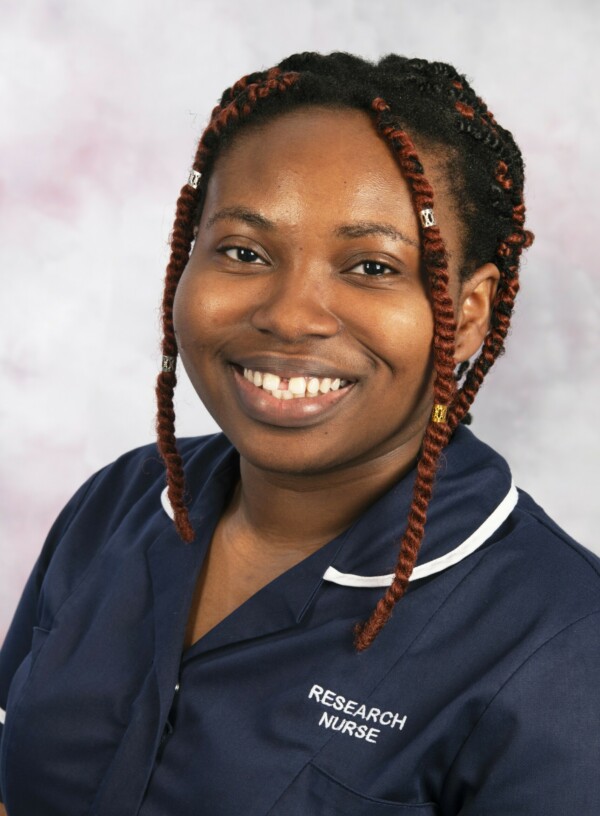Celebrating International Nurses Day 2024 – blog by Favour Adoghe, BRC Research Nurse
It’s that time of year when we celebrate and raise awareness of the invaluable role and contribution that nurses play in healthcare! To mark this year’s International Nurses Day, celebrated around the world every 12 May – the anniversary of Florence Nightingale’s birth – Favour Adoghe shares an insight into her role as a Biomedical Research Centre (BRC) Research Nurse at Blackpool Teaching Hospitals NHS Foundation Trust.
Transforming scientific breakthroughs into diagnostic tests and life-saving treatments for patients, the National Institute for Health and Care Research (NIHR) Manchester BRC brings together world-leading researchers based at The University of Manchester and six NHS Trusts across the North West. Blackpool Teaching Hospitals NHS Foundation Trust joined Manchester BRC as part of its 2022-27 funding award.
Have you ever wondered what it’s like to be a Research Nurse? Today is International Nurses Day (12 May) and I’m excited to share a glimpse into my world as a Biomedical Research Centre (BRC) Research Nurse! Based within the Research Department at Blackpool Victoria Hospital, part of Blackpool Teaching Hospitals NHS Foundation Trust, my role extends beyond the hospital walls. As a BRC Research Nurse, I contribute to the vital work set out by the National Institute for Health and Care Research (NIHR) Manchester Biomedical Research Centre.
From the beginning
My passion for research emerged and blossomed while attending Keele University. During my time at University, I gained an interest in research and its fundamental role towards improving patient care and treatments. My project work was published in the University Journal of Academic Development and Education (JADE), titled “The development of self-care skills by heart failure patients using telemonitoring”. The process enabled me to develop and deepen my desire to work in research and to be involved within the research processes.
After finishing my degree as an adult nurse, I then decided to work as a Cardiac Intensive Therapy Unit (CITU) nurse to build my clinical skills. When an opportunity arose, I transitioned into Research specialising within cancer. To further develop my career within research, I applied for the BRC-funded Nurse position and was successful. I have been in this role over a year now and I have enjoyed every aspect. I lead on all BRC trials in Blackpool and assist the team to improve the health and wellbeing of many people.
My day-to-day
My day typically starts with reviewing patients’ information and screening patients for upcoming clinic visits. These visits involve collecting vital signs, blood samples, patient information, and monitoring patients for any side effects. The research environment within Manchester BRC is fast-paced and collaborative. We work closely with Clinicians, Researchers and Coordinators across different hospitals and institutions, all connected under the Manchester BRC umbrella.

BIOTIPRA
One project I’m involved in is a clinical feasibility study for Rheumatoid Arthritis (RA) patients called BIOTIPRA, conducted through Manchester BRC. This study aims to determine whether it is feasible to run a much larger study wherein blood test analyses will determine levels of Adalimumab (a treatment for RA) and antibodies (which sometimes form to stop the drug from working). This will be undertaken by taking blood samples donated by patients at different time points. The data outputs will then be fed back to clinicians with medication advice. The aim is to improve the symptoms and health of RA patients compared to standard care. If successful, this BRC-led research could pave the way to significantly improve the lives of many people living with RA.
IMID
I am also passionate about the Immune-Mediated Inflammatory Diseases (IMID) BioResource, which I currently lead on as part of my role within Manchester BRC. This is a recallable resource of participants with IMID including rheumatoid arthritis, systemic lupus erythematosus and psoriasis. One of the main aims of the IMID BioResource is to study the common and shared genetic traits in IMID patients, as well as immune inflammatory pathways. I am enthusiastic about this because I believe that when more clinical and genetic data is collected and analysed, this will enable symptom improvement in patients with IMID. In Q4 of the last year (May 2024), Blackpool Victoria Hospital was the top recruiter for this study in the United Kingdom. This demonstrates the great work we can do in Blackpool.
Patient care
I have had patients who are on treatment for RA who have struggled with symptoms for a while and hadn’t found relief with any previous medications. In this study, I monitor their progress and provide support as part of the BRC research team. Witnessing their symptoms and quality of life improve through participation in a BRC study is incredibly rewarding.
Motivations
What motivates me most as a BRC Research Nurse is the chance to contribute to groundbreaking discoveries on a national scale. Manchester BRC fosters collaboration between researchers and healthcare professionals across various organisations. Knowing that our work here at Blackpool Victoria Hospital contributes to this larger effort to push the boundaries of medical knowledge and develop better treatments is incredibly inspiring.
Working as a BRC Research Nurse is extremely rewarding. We play a key role in advancing medical knowledge and improving healthcare for everyone. Today, this International Nurses Day, I’m proud to be part of such a dedicated and collaborative network.
Are you curious about BRC research studies? Visit Our Research page to learn more!
Manchester BRC was awarded more than £60 million from the NIHR for 2022 to 2027 to translate scientific discoveries into new treatments, diagnostic tests, and medical technologies to improve people’s lives and reduce health inequalities in Greater Manchester, Lancashire and South Cumbria.
A recent study supported by Manchester BRC which highlights these inequalities, found living in the North of England increases risk of death from alcohol, drugs and suicide, of which Blackpool has the highest rate. Find out more about this research on the NIHR Applied Research Collaboration Greater Manchester website.
